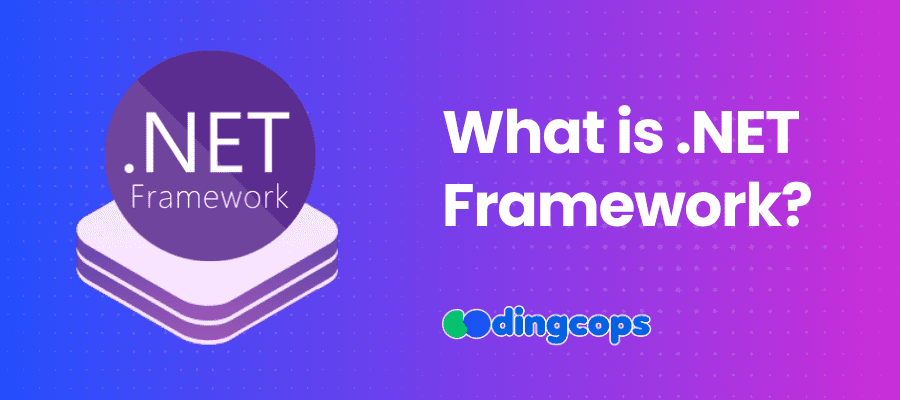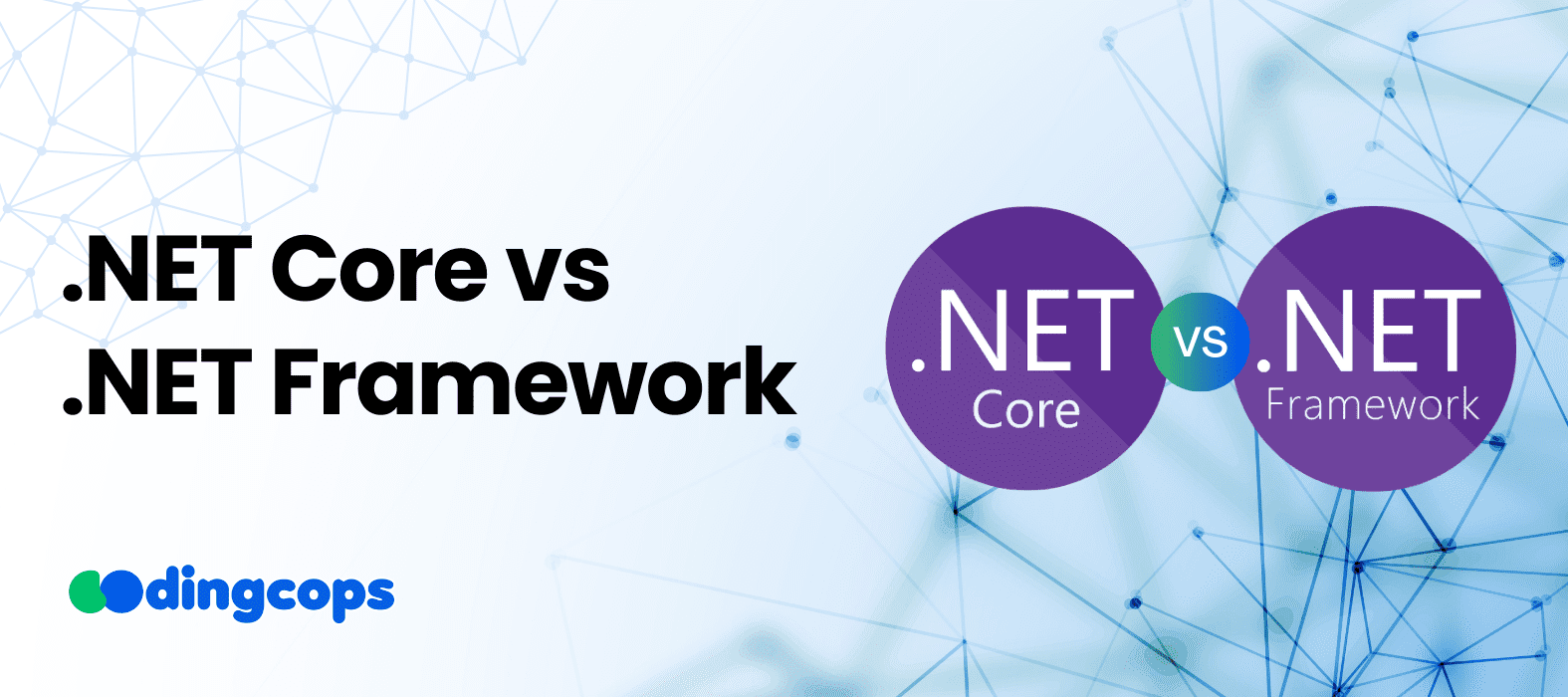When it comes to software development, two stars have gained huge popularity these days. They are .NET Core and .NET Framework that help developers create effective, adaptable, and strong apps. Both of these have their base from Microsoft but they deal with different project needs and audiences.
Knowing the differences between these two, their strengths, and their weaknesses can help you make the decision when it comes to .NET Core vs .NET Framework.
What Is .NET Core?

.NET Core is like a fast spaceship designed for the modern universe of application development. It was launched by Microsoft in 2016 and offers cross-platform capabilities that allow developers to build and run applications on Windows, macOS, and Linux.
It’s the go-to choice for creating microservices, web applications, and serverless functions that need to operate in diverse environments.
Advantages of .NET Core
- It offers cross-platform support and speaks the universal language of the developer community. It means it runs smoothly across different operating systems.
- .NET Core has high performance and is one of the fastest frameworks that developers use for creating web apps.
- It is a perfect choice for developing microservices and developers can adapt and deploy these microservices independently.
- .NET Core is an open-source framework and its blueprint is open for all to see, contribute to, and improve. Thus, it offers huge community support.
Disadvantages of .NET Core
- Its ecosystem is still growing, it is relatively new. Some tools and third-party libraries are not readily available in this framework.
- Developers who know the .NET Framework still need to learn a lot to become an expert in NET Core.
What Is .NET Framework?

On the other side of the galaxy, we have the .NET Framework. It is the established ruler of the Microsoft development space since its release in 2002. It’s a comprehensive and feature-rich platform designed to build Windows applications, services, and games. It’s renowned for its vast ecosystem, strong support, and seamless integration with Windows features.
Advantages of .NET Framework:
- It is a relatively mature ecosystem with wide libraries, tools, and community resources.
- The .NET framework can build a wide range of apps, from web services to desktop apps.
- It offers amazing performance and integration on Windows.
Disadvantages of .NET Framework
- It is restricted to Windows and lacks the capabilities for macOS or Linux systems.
- .NET framework lacks in adapting to rapid changes in modern app development.
.NET Framework vs .NET Core
There are several points on which you can evaluate the difference between .NET Core and .NET Framework. They may also contribute to the decision-making process.
1. Performance and Speed
.NET Core
.NET Core provides enhanced performance and efficiency. It has a modular architecture that allows developers to include only the necessary packages, reduce the app size, and increase the overall performance. Operating systems can perform runtime optimizations and develop a better mechanism of garbage collection, which will result in faster code execution since this is typically noticed on web and cloud-based set-ups.
.NET Framework
.NET Framework has its own strengths, especially on Windows. But when it comes to cross-platform performance, the .NET Framework doesn’t match the performance levels of .NET Core. It carries a more extensive library set by default, which can sometimes result in slower performance for high-demand applications.
2. Cross-Platform Development
.NET Core
.NET Core shines brightly in this arena, offering full support for building and deploying applications on Windows, Linux, and macOS. Because of this flexibility, businesses looking to expand their development teams get a lot of opportunities.
For projects that need server-side technologies or real-time apps outside the .NET ecosystem, the best option can be to Node js developers. They are expert in creating adaptable and effective apps that run on different platforms.
.NET Framework
.NET Framework is limited to Windows. While it offers deep integration and optimization for Windows environments, its inability to run natively on other operating systems restricts its applications to the Windows ecosystem.
3. Ecosystem and Libraries
.NET Core
.NET Core is relatively younger but it has rapidly built a strong and growing ecosystem because of its open-source nature and Microsoft’s aggressive investment. While some niche or legacy libraries may still be in the process of being ported or rewritten for .NET Core, the gap is quickly closing, with most new development focused on this platform.
.NET Framework
.NET Framework has the advantage of time, having been developed and enriched with libraries, tools, and a community over many years. This richness gives a wide range of built-in functionalities and is compatible with various Windows-specific features and legacy applications.
In cases where your project needs an enterprise-level solution on different platforms, it will be beneficial to Java developers, as Java is the perfect choice for enterprise environments and large-scale environments.
4. Compatibility and Migration
.NET Core
.NET Core was built with compatibility in mind but from a future perspective. Its primary goal is to bring structure and synergy to the .NET ecosystem which otherwise makes future migration and compatibility a piece of cake for new applications being developed. However, moving existing .NET Framework applications to .NET Core might require some modifications, especially if they rely on Windows-specific libraries not supported by .NET Core.
.NET Framework
.NET Framework applications, particularly those that are older or deeply integrated with Windows-specific features (like Windows Forms or WPF), may face challenges in migrating to .NET Core due to compatibility issues. This model is most appropriate in instances where legacy compatibility is the key consideration.
5. Future-Readiness and Support
.NET Core
.NET Core is the focus of Microsoft’s long-term vision for the .NET ecosystem, receiving the bulk of new feature developments, performance improvements, and security updates. Its map is in tune with the app development of the future, and it comprises high-performance web services, microservices architecture, and containerized apps.
.NET Framework
.NET Framework has entered a phase where it receives primarily maintenance updates. Besides the fact that it is still a good choice for many of the applications presently working. Its evolution is more conservative, concentrating on the stability and compatibility of the existing systems rather than introducing any new features.
6. Development Flexibility
.NET Core
.NET Core offers a more flexible development environment, suitable for a wide range of application types, including web, cloud, mobile (via Xamarin), and microservices. Its command-line interface and compatibility with various editors and IDEs (Integrated Development Environments) make it accessible to developers on any platform.
.NET Framework
.NET Framework provides a strong development environment for Windows desktop applications and web services. It combines very nicely with Visual Studio and provides a set of strong tools for building highly complex apps. However, its flexibility is somewhat limited by its Windows-centric nature.
Conclusion
Whether you choose .NET Core or .NET Framework depends on your application’s particular demands such as the target platform, performance, and future development path. .NET Core delivers a current and cross-platform set of high-performance and flexible tools to be used for developing new applications. Whereas .NET Framework remains a strong contender for Windows-oriented projects requiring a mature ecosystem and deep integration with the operating system.
More Related Blogs
- React vs. Backbone.js
- Top 10 Future of React in 2024
- React Lifecycle Methods
- React State Management Libraries
- Go developers
- dedicated React developers





